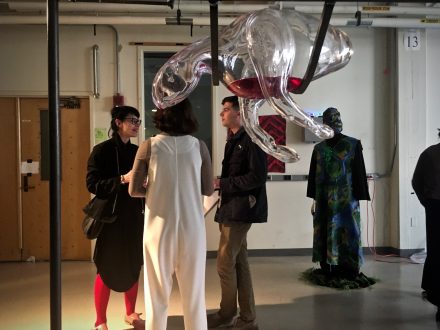Residency
The minimum required residency for students enrolled in the SMACT program is two academic years. SMACT students do not register for summer term.
Academic Advisor
A faculty advisor from the Art, Culture and Technology Program (ACT) is assigned to each graduate student at matriculation. The advisor will consult with the student on an initial plan of study and on each subsequent term’s choice of subjects. The academic advisor monitors the student’s progress through completion of the degree.
Thesis and Thesis Advisor
In addition to their course and studio work, SMACT students submit a written thesis at the end of the two year program. In their third semester, students select a thesis advisor to supervise the completion of their master’s thesis. This may be the same faculty member as the student’s academic advisor, or they may choose to work with a different faculty member.
Credit Units
Students take at least 135 total units of coursework to complete the SMACT degree, which includes hours taken for Thesis colloquium, preparation, and tutorial (4.387, 4.388 and 4.389, 9 units each). The 24 units earned for taking 4.THG do not count toward your SMACT degree requirements.
SMACT coursework requirements
The curricular overview addresses ACT curricular requirements in detail. This worksheet can be used to plan your degree.
In addition, students must comply with MIT graduation requirements as listed at http://web.mit.edu.ezproxy.canberra.edu.au/registrar/graduation/checklist.html to graduate.
Art, Culture and Technology Studio
4.390 Art, Culture and Technology Studio is restricted to SMACT degree students and serves as the core of the curriculum. It is lead by an ACT faculty member and involves the participation of all faculty currently advising SMACT candidates and all SMACT students. Students are expected to participate in all class meetings and present project development regularly. Attendance at the ACT Lecture Series and other ACT events is expected. Project work is related to the student’s evolving thesis project. Participation in ACT Studio midterm and final reviews is required.
Policy on Incomplete Subjects
SMACT students may have no more than one Incomplete in a required subject when they register for Thesis (4.THG). This Incomplete can be no more than one term old (received the semester prior to thesis registration). Students who have incompletes from several subjects or incompletes from earlier terms will be denied registration until those subjects are finished and graded. This policy applies to incompletes in subjects required by the specific degree curriculum or needed for units toward the degree.
Studios, Equipment and Shop Access
A studio to be used for academic purposes is assigned to each entering SMACT student. Keys will be distributed at orientation. Continuing students may keep their studio space through the summer into their final year but must move any items outside of their studios into their studios by the date indicated on the ACT calendar for that semester. Graduating students are expected to empty and clean their studios by the date indicated on the ACT calendar for that semester.
Equipment can be checked out during Equipment Checkout hours in the fall and spring terms and must be returned to to the Media Assistant or Technical Instructor when due. It may also not be kept any later than the Monday after the ACT Studio final review at the end of each term. Students may be fined for overdue equipment. Equipment is not available during IAP or summer session.
A $250 studio and equipment deposit will be charged to each student’s bursar account upon entering the program.
MIT English Proficiency Requirement
Unless a waiver is approved by the Program Director, all students whose first language is not English will be required to take the English Evaluation Test (EET) prior to registration at MIT. Even students who satisfy the International English Language Testing System (IELTS) or TOEFL requirement for admission may be required to take specialized subjects in English as a Second Language (ESL), depending on their EET results. These subjects do not count toward the required units but will prove valuable in helping students develop the skills necessary to comfortably write a thesis.


